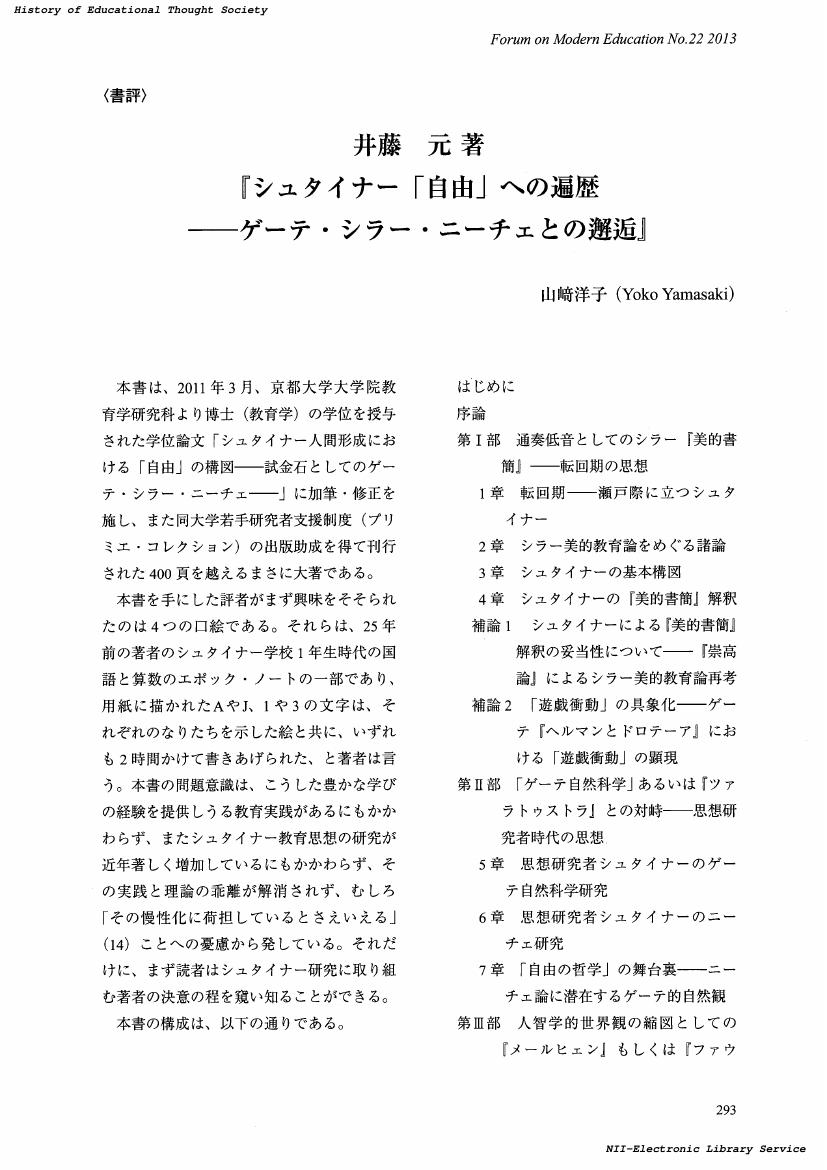3 0 0 0 OA 健康志向・美容志向とfat talk従事頻度の関連の検討
- 著者
- 高村 愛 山崎 洋子 大森 美香
- 出版者
- 一般社団法人 日本健康心理学会
- 雑誌
- 日本健康心理学会大会発表論文集 30 (ISSN:21898812)
- 巻号頁・発行日
- pp.44, 2017 (Released:2017-11-06)
1 0 0 0 IR 医療福祉相談室における看護師の役割
- 著者
- 三平 まゆみ 深沢 紀代美 高野 和美 山岸 春江 山崎 洋子
- 出版者
- 山梨大学看護学会
- 雑誌
- 山梨大学看護学会誌 (ISSN:13477714)
- 巻号頁・発行日
- vol.2, no.1, pp.21-24, 2003
医療福祉相談室(以下,相談室)における看護師の役割を明らかにするために,相談室の看護師が関わった相談者150人の初回相談時の主な相談内容を調査した。相談者で一番多かったのは看護師70人(46.7%)で,内容としては医療器具に関する事38件(25.3%),在宅療養27件(18.0%),退院に向けて25件(16.7%)の相談であった。相談解決のために,当院の医療スタッフ,市町村役場,保健所,訪問看護ステーション等の関係職種に協力を求めた。相談室における看護師の役割として,医療用消耗品の選定・情報提供を行う事,病状や家庭事情に合わせた社会福祉資源を検討する事,病院内外を問わず関係職種との連絡調整を行う等の役割があることが示唆された。
1 0 0 0 OA 生成し/生成される教師を「語る」 「論述行為」の意味への問いに誘われて
- 著者
- 山崎 洋子
- 出版者
- 教育哲学会
- 雑誌
- 教育哲学研究 (ISSN:03873153)
- 巻号頁・発行日
- vol.2006, no.93, pp.14-20, 2006-05-10 (Released:2010-05-07)
- 参考文献数
- 10
- 著者
- 山崎 洋子
- 出版者
- 教育哲学会
- 雑誌
- 教育哲学研究 (ISSN:03873153)
- 巻号頁・発行日
- vol.2000, no.81, pp.92-111, 2000-05-10 (Released:2010-05-07)
- 参考文献数
- 48
The present paper studies the “self-realization” concept of E. Holmes, a substantial leader of the organization called the “New Ideals in Education, ” which spread out ahead of the New Education Movement in England during the early 20th century. Moreover, the paper aims to modify the traditional interpretation of Holmes' “self-realization” to the effect that his is not more than “removing social implication from T. H. Green's Idealism.” The present author will approach Holmes' concept from a broader perspective.First, the author shows by an analysis of Holmes' autobiography as well as his articles that his “New Ideals” were formed by his critical thinking when he underwent mental conflicts and slumps at the time of H. M. I. under the “payment by results” system. In his criticism of the Western standards of value, Holmes strongly advocated the conversion of a path to mechanical obedience into the path to self-realization in schools. Second, the author argues that Holmes' insistence on the “emancipation” and “freedom” of the child derived from his original ideas which may be summarized as his trust in vitalizing abilities and well-being of the human self; sympathetic, aesthetic as well as scientific instincts as three arterial ones. Finally, the author clarifies that his theory of self-realization which takes a variety of forms such as “self-forgetfulness”, “self-unfolding”, “self-expression, ” “self-expansion” and “self-extension” has societal and religious implications. In his theory, the process leads the “self of child”, with its proper balance with the organic Universe, to One Life, a balance which is struck between the human being as a microcosm and the Nature as the macrocosm.Through the above the author shows that Holmes' concept of “self-realization” is ambiguous, that it cannot be interpreted as “removing of social implication”, that there was a further metaphor to the “emancipation of child”, and that a rhetoric is submerged in Holmes' concept. His path to self-realization can be interpreted as a philosophy of Wholeness, or of All is One, a major forerunner of the educational reform movements in the 20th century.
1 0 0 0 OA 中毒性巨大結腸症と穿孔を合併した再燃劇症型潰瘍性大腸炎の 1 例
- 著者
- 中田 中泰彦 中島 洋介 窪田 信行 海賀 照夫 間宮 孝夫 三原 良明 山崎 洋子 神野 大乗 小林 槇雄 宮田 隆 西尾 みどり 高橋 利実
- 出版者
- 日本大学医学会
- 雑誌
- 日大医学雑誌 (ISSN:00290424)
- 巻号頁・発行日
- vol.72, no.1, pp.26-29, 2013-02-01 (Released:2014-11-30)
- 参考文献数
- 12
- 被引用文献数
- 1 1
症例は 50 歳女性,平成 5 年より全大腸炎型の潰瘍性大腸炎の診断で治療を継続していた.平成 19 年以降は 5-ASA 製剤の単独投与で寛解していたが急性増悪し,中毒性巨大結腸症,穿孔を合併し緊急手術を施行した.中毒性巨大結腸症は高率に穿孔を発症し,穿孔症例の死亡率は 20-40%であるため手術のタイミングを適切に判断することが重要である.また長期経過した全大腸炎型の潰瘍性大腸炎は癌化のリスクが高くなるため,二期手術の時期や術式について慎重に判断しなければならない.
- 著者
- 山崎 洋子
- 出版者
- 教育思想史学会
- 雑誌
- 近代教育フォーラム (ISSN:09196560)
- 巻号頁・発行日
- vol.22, pp.293-298, 2013-09-14 (Released:2017-08-10)
1 0 0 0 OA 環境看護の視点からみた病院環境の評価
1 0 0 0 <総説>公立図書館の乳幼児サービスと育児支援
- 著者
- 山崎 洋子
- 出版者
- 山梨大学
- 雑誌
- 山梨大学看護学会誌 (ISSN:13477714)
- 巻号頁・発行日
- vol.7, no.2, pp.1-4, 2009


